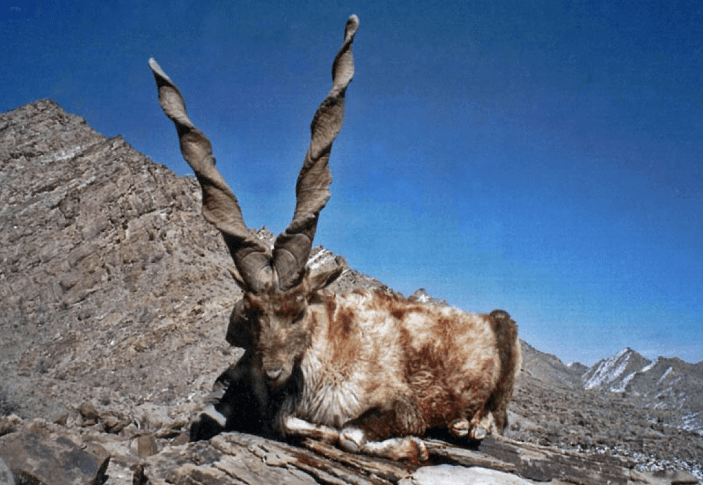Bids Invited for Hunting Permits for Markhor. The Sindh Wildlife Department has initiated the process for Markhor and Urial hunting permits for the upcoming 2023-24 trophy hunting season in Jamshoro.
Read More: Balochistan Issues Congo Virus Red Alert
Bids are invited from both domestic and foreign hunters and registered tour operators. Foreign hunters can obtain permits for Sindh ibex (15 permits at $6,000 each) and Urial (five permits at $20,000 each) in specific areas.
Pakistani hunters can secure permits for Markhor (five permits at Rs400,000 each) but are not allowed to export the hunted animal.
Read More: Balochistan Issues Congo Virus Red Alert
The auction of a total of 25 hunting permits will take place at the conservator’s office on November 21.
Here are some essential points to consider:
- Conservation Efforts: Conservation efforts play a crucial role in preserving Pakistan’s wildlife and natural heritage.
- Endangered Species: Many endangered species, such as the Markhor, rely on conservation initiatives to survive.
- Wildlife Preservation: Wildlife preservation is essential to maintain biodiversity and protect vulnerable species.
- Eco-Tourism Opportunities: Trophy hunting can coexist with eco-tourism, offering opportunities for nature enthusiasts.
- Hunting Regulations: Strict hunting regulations are in place to ensure responsible and ethical hunting practices.
- Protected Habitats: Wildlife conservation often involves safeguarding the natural habitats of various species.
- Trophy Animals: Trophy animals like the Markhor require special conservation attention due to their unique status.
- Biodiversity Conservation: Biodiversity conservation aims to maintain a variety of species and ecosystems.
- Sustainable Hunting: Sustainable hunting practices help balance ecological and economic interests.
- Responsible Tourism: Responsible tourism includes ethical hunting practices and the protection of local ecosystems.
- Species Protection: Species protection is a key objective of wildlife management and conservation programs.
- Eco-Friendly Tourism: Promoting eco-friendly tourism benefits both nature and the local economy.
- Hunting Permits Auction: The auction of hunting permits contributes to wildlife conservation funding.
- Conservation Awareness: Creating awareness about conservation is vital for fostering support.
- Nature Safaris: Nature safaris and wildlife tours offer insight into the beauty of Pakistan’s wilderness.
- Preserving Natural Heritage: Preserving Pakistan’s natural heritage safeguards its unique ecosystems.
- Sustainable Wildlife Practices: Promoting sustainable wildlife practices can benefit both animals and communities.
- Conservation Partnerships: Collaboration with local communities is essential for successful conservation partnerships.
- Sustainable Ecology: Ensuring sustainable ecology is a shared responsibility for humanity.
- Eco-Tourism Initiatives: Eco-tourism initiatives encourage visitors to appreciate and support conservation efforts.
- Ecosystem Balance: Achieving ecosystem balance is a core goal of wildlife conservation.
- Community Involvement: Engaging local communities in conservation efforts ensures shared benefits.
- Wildlife Legislation: Legislation supports the protection of wildlife and their habitats.
- Sustainable Management: Sustainable wildlife management practices promote long-term conservation.
- Biodiversity Hotspots: Pakistan boasts biodiversity hotspots rich in unique species.
- Trophy Hunting Guidelines: Strict trophy hunting guidelines are implemented to maintain ethical standards.
- Habitat Preservation: Habitat preservation initiatives protect the natural homes of wildlife.
- Balancing Conservation and Hunting: Balancing conservation goals with responsible hunting is essential.
- Sustainable Resource Use: Sustainable resource use is critical for preserving wildlife and natural resources.
- Ethical Tourism: Ethical tourism emphasizes wildlife conservation and protection.
- Wildlife Rehabilitation: Wildlife rehabilitation programs help injured or orphaned animals.
- Conservation Tourism: Conservation tourism contributes to protecting Pakistan’s diverse ecosystems.
- Endemic Species: Pakistan is home to numerous endemic species found nowhere else on Earth.
- Conservation Strategies: Various conservation strategies are employed to ensure species survival.
- Economic Benefits: Wildlife conservation provides economic benefits to local communities.
- Nature’s Beauty: Appreciating nature’s beauty is a primary motive for wildlife enthusiasts.
- Hunting Traditions: Preserving hunting traditions with a focus on conservation is possible.
- Biodiversity Enthusiasts: Biodiversity enthusiasts celebrate the variety of life on Earth.
- Ethical Conservation: Ethical conservation practices protect wildlife from harm.
- Eco-Diversity: Pakistan’s eco-diversity is a testament to its rich natural heritage.
- Environmental Responsibility: Environmental responsibility includes safeguarding wildlife habitats.
- Trophy Hunting Revenue: Revenue from trophy hunting benefits both conservation and local communities.
- Wildlife Education: Wildlife education programs foster understanding and respect for nature.
- Species at Risk: Conservation efforts aim to save species at risk of extinction.
- Environmental Harmony: Achieving environmental harmony is crucial for wildlife protection.
- Protected Areas: Protected areas are vital for safeguarding wildlife and natural landscapes.
- Wildlife Sanctuaries: Wildlife sanctuaries provide safe spaces for endangered species.
- Natural Resources: Protecting natural resources is intertwined with wildlife conservation.
- Eco-Conscious Travel: Eco-conscious travel promotes environmentally friendly tourism.
- Conservation Success Stories: Success stories highlight the positive outcomes of conservation efforts.
- Cultural Heritage: Cultural heritage is intertwined with wildlife and nature.
- Wildlife Support: Supporting wildlife initiatives strengthens conservation efforts.
- Trophy Hunting Ethics: Trophy hunting ethics demand adherence
Note: The information above might not be accepted 100%. Please verify from your own sources. We will not be responsible for any kind of loss due to our content.
For more news, please visit Munafa Marketing.




